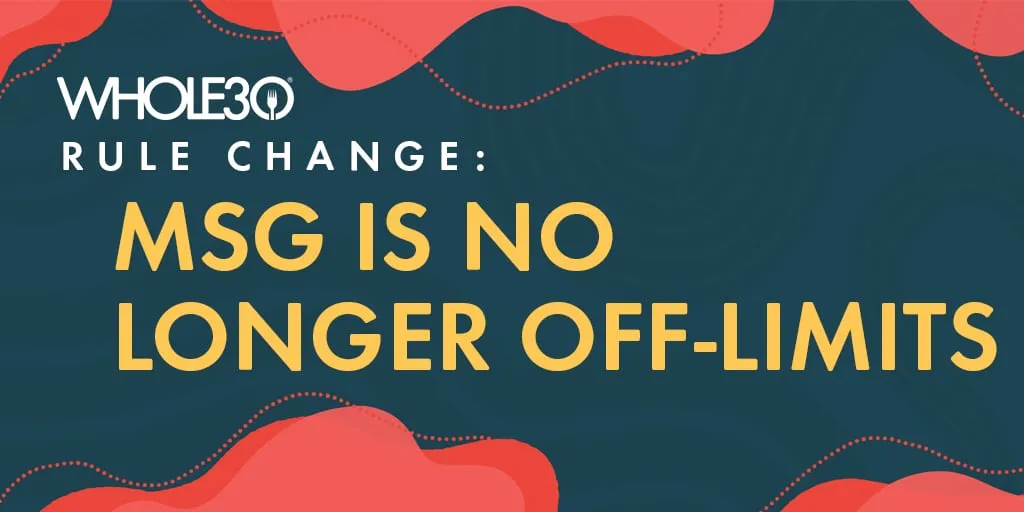We are always evaluating the Whole30 rules against the current science, our clinical experience, and our learnings. Today I have a wonderful announcement—a rule change that ties together not only the current science and historical learnings, but our diversity, equity, and inclusion values:
Whole30 will no longer rule out MSG as one of our off-limit additives. Moving forward, MSG is okay on your Whole30.
History and Background From Whole30 CEO Melissa Urban
I’ve been thinking about eliminating MSG from the program rules for about two years now, and it all started with a podcast. In 2019, I caught an episode of This American Life called The Long Fuse, in which a PhD student began to research the origins of “Chinese Restaurant Syndrome,” and the roots of the demonization of MSG in American culture. Well, root, singular. There was just one—a letter to the editor in the New England Journal of Medicine. Not a study. Not even research. Just one man’s experience after dining at a Chinese restaurant, offered as an opinion piece and printed in the Correspondence section.
That podcast led me down a rabbit hole into the history of MSG, the coining of the condition “Chinese Restaurant Syndrome,” and the scientific evidence going back to the 1960’s. It led me to this 2017 report from Colgate University, in which Dr. Jennifer LeMesurier wrote, “Although the unwillingness to consume MSG is posited as rooted in medical evidence, the discourses that surround the genesis of this object as a topic in the public sphere are racially inflected at best and racially prejudicial at most.” (This entire paper is a sermon.)
Additional readings from companies like Omsom and Fly By Jing, Antiracism Daily, and The New York Times added to my understanding: The case of MSG demonstrates how racist attitudes toward a certain ethnic group can quickly be taken up and incorporated into the public sphere, perpetuating prejudiced narratives.
I went on to review this article, with a good summary of the research (about halfway down the page), and this 2019 summary from Today’s Dietitian. Much like the author of the Colgate report, the MDs and RDs here report that in general, the findings “aren’t incredibly convincing.” In fact, the majority of recent research reveals that this flavor component simply isn’t cause for concern for most people.
Finally, we consulted with Registered Dietitian Michelle Jaelin, an expert in dietetics and MSG. She summarized the issue by saying “MSG is one of the most misunderstood substances in the food supply. The western media has unfairly attributed MSG to be the cause of negative health symptoms, mostly based on anecdotes, poor science, and anti-immigration and anti-Chinese sentiments. There isn’t enough evidence to say with certainty that MSG causes health problems and the entire concept has roots in xenophobia, or more accurately Sinophobia (the fear or dislike of China and its people).”
MSG is Okay on Whole30: The Rule Change
Since the 1990s, the FDA has listed MSG as perfectly safe for its intended use, just like vinegar, salt, or pepper. But this one letter to the editor launched an entire MSG scare that has persisted for decades. Even today, 42% of all Americans still think that it’s bad for you. But it turns out the negative associations around MSG are rooted in racism and questionable research that dates back to the 1960s. And in fact, decades of research have not found a strong connection between MSG and the symptoms that people associate with consuming it.
In our research, the science doesn’t demonstrate causal evidence of MSG being problematic when consumed in a normal sized dose. Though some shaky correlative evidence exists, it’s no more compelling than any other additive to which some folks report sensitivity, like xanthan gum or citric acid. (Both of which are perfectly acceptable on the Whole30.) In general, the studies of MSG have been found to be unreliable, with inconsistent results and often, extreme, excessive dosages used–which doesn’t mimic eating in the real world.
Between the lack of verifiable science to back up these claims and the very compelling evidence that “Chinese Restaurant Syndrome” is rooted in racism and xenophobia, we will no longer specify MSG as off-limits in the Whole30 program rules, effective immediately.
You’ll find this new change across our entire website, in all of our PDF downloads, and in any Whole30 blog post that previously referenced MSG. Please make note of this change when sourcing Whole30 rules from existing books, which won’t have this most up-to-date information.
As always, thank you for your support. My team works hard to ensure the program is as effective as possible, while staying current on the latest science and clinical evidence. We are all convinced that this small but meaningful change is the right thing to do.
XO Melissa
An MSG FAQ
Yes, consuming MSG is okay on your Whole30. We no longer include MSG on our list of additives excluded from the program.
People can be sensitive to all kinds of generally safe and healthy things, including eggs, broccoli, or xanthan gum. But we have decided the evidence is no longer strong enough for us to specifically call this additive out in the Whole30 rules. (As an aside, Registered Dietitian Michelle Jaelin also says these reactions may be the result of a tyramine intolerance, not necessarily a reaction to MSG.)
You probably won’t find “MSG” on a Whole30 compatible food label. You may find some brands of canned tuna that contain MSG, but in general, it’s not an additive found in Whole30 foods. (However, as an interesting aside, MSG is chemically indistinguishable from glutamate, a common amino acid found in everything from tomatoes to chicken soup to mayonnaise and beef jerky. It’s likely you eat glutamate in some form on a regular basis.)
While this rule change might not impact your grocery shopping experience, it’s important for us to right the wrong we made when excluding it from the program back in 2010. Removing it from our rules is a small but powerful way of calling out the racism and xenophobia behind the stigma, and allows us to share more accurate, reliable information with our community.
Yes, you could now add MSG to tomato sauces, soups, stews, salads, dips, or dressings. You can find MSG in your local Asian market, or in the spice aisle of many grocery stores. The brand Ajinomoto, from the folks who first discovered MSG, is one of the more popular. (Just shake it on to taste, like salt.)
Traditionally, it would be fermented from seaweed broth. Today, it’s made from the fermentation of a number of plant-based substances, such as sugar cane, sugar beets, cassava or corn. Because none of the fermented substrate (such as the sugar or corn) carries forward into the MSG product itself, regardless of how it’s made, MSG is compatible with the Whole30.
MSG produces the same kind of umami flavor that comes from mushrooms or dried seaweed. It’s not salty, it’s savory, and a little can add a ton of flavor to sauces, soups, stews, salads, veggie dishes, and more.
As with any Whole30 food or beverage, if your body doesn’t respond well to something, whether that’s almond butter, sparkling water, or MSG, leave it out of your program. But it would be an interesting experiment to see if adding MSG to your Whole30 salad or stew produced the same “side effects” as consuming Chinese take-out. (Maybe it’s not the MSG.)
Disclaimer: This page contains affiliate links. We earn a small commission when you purchase through these links.

















